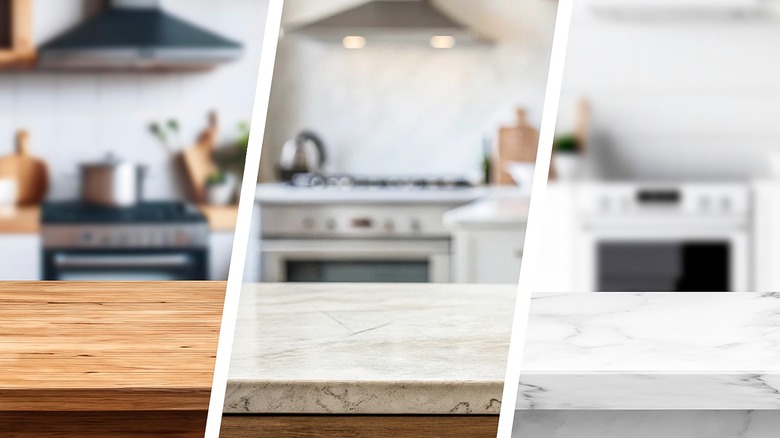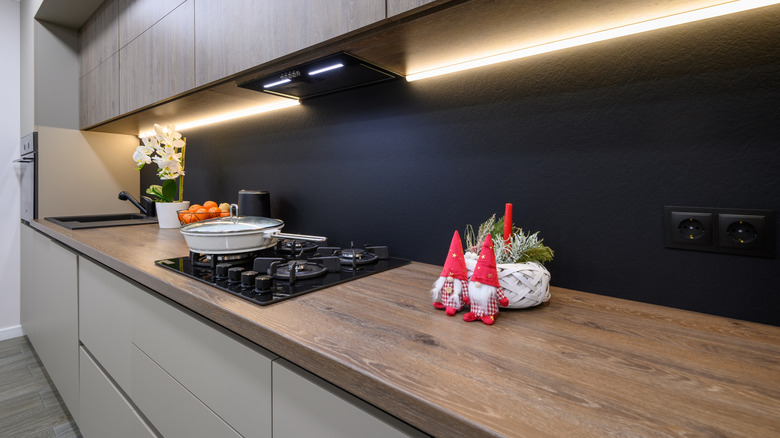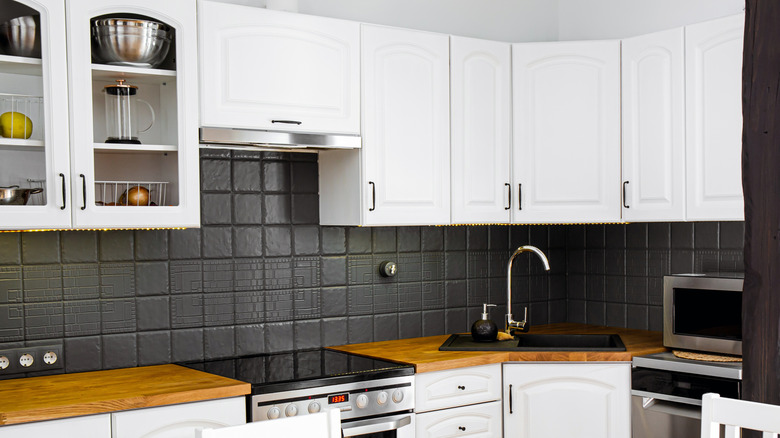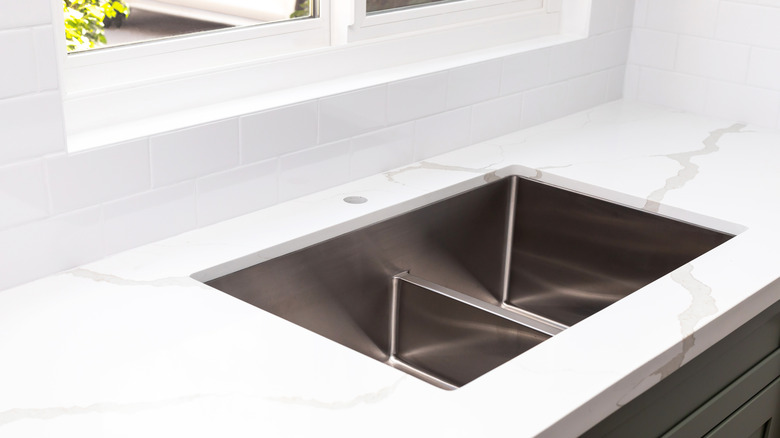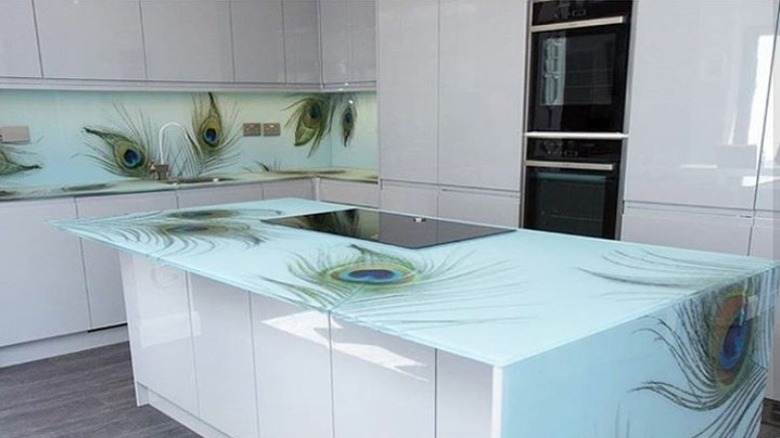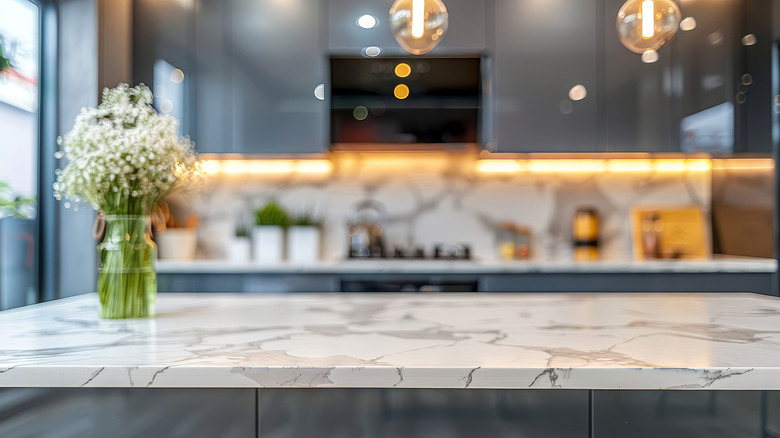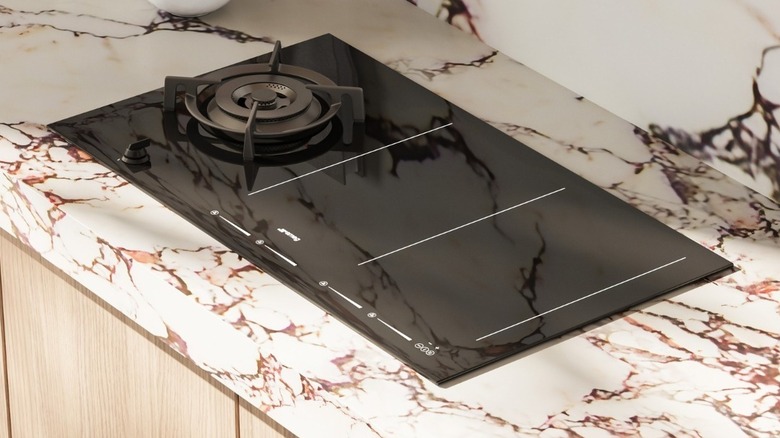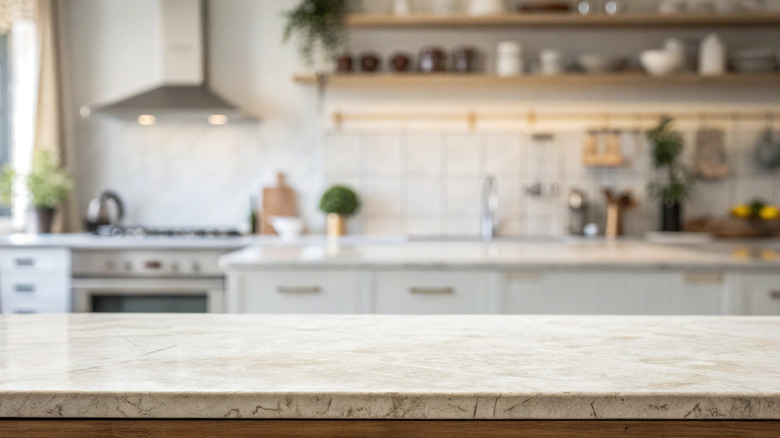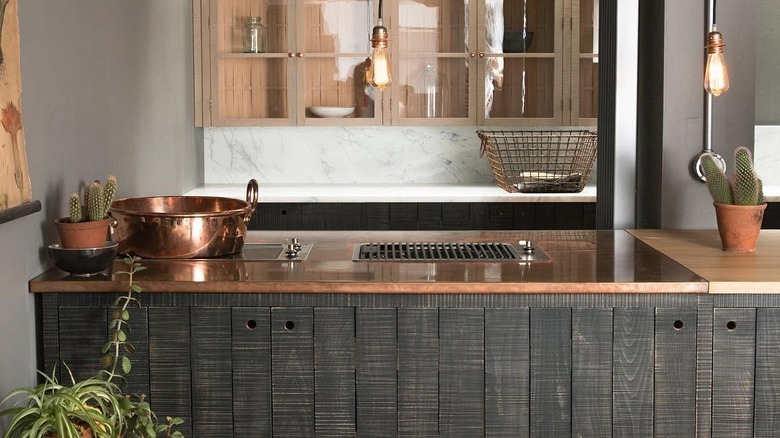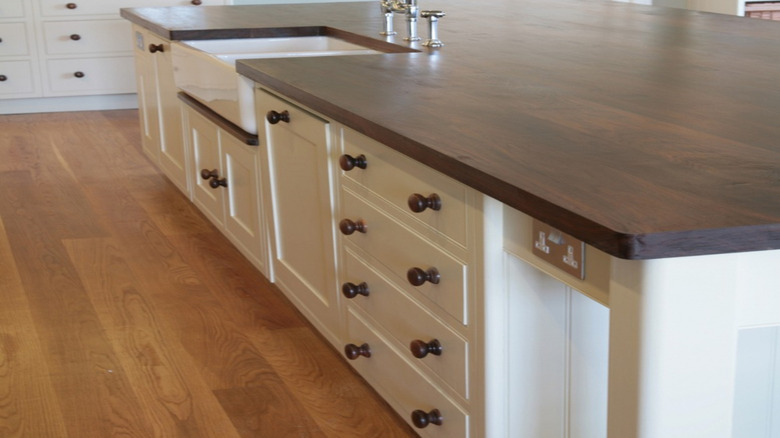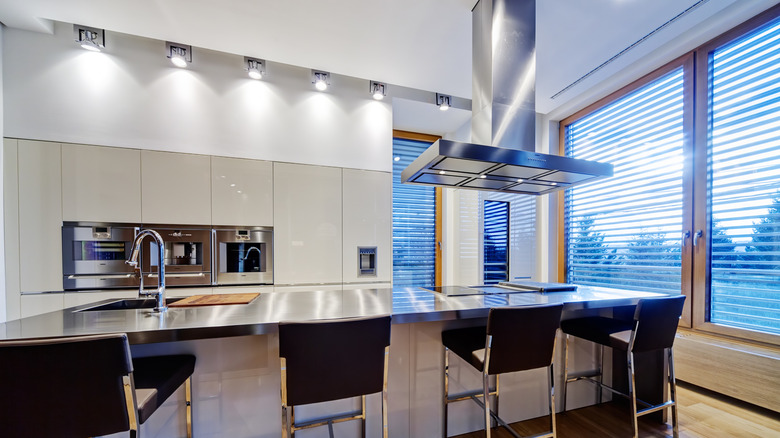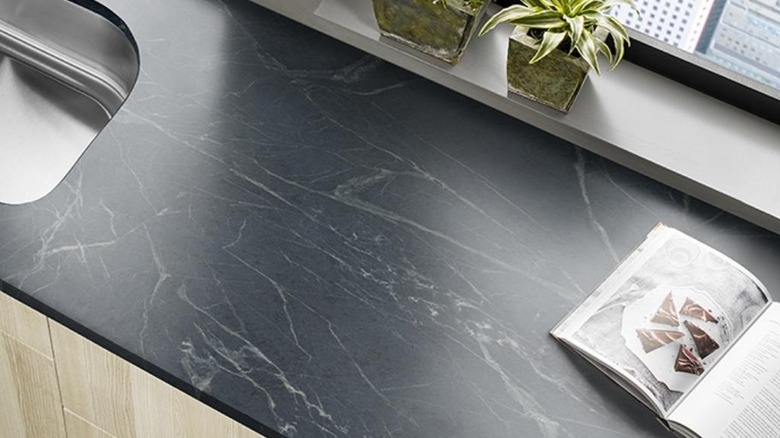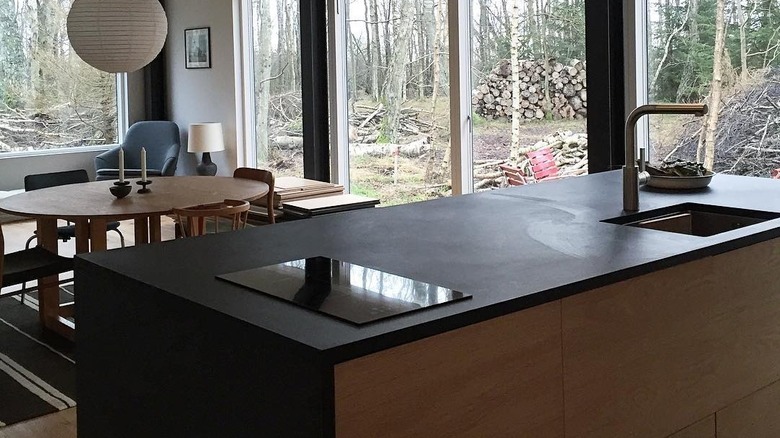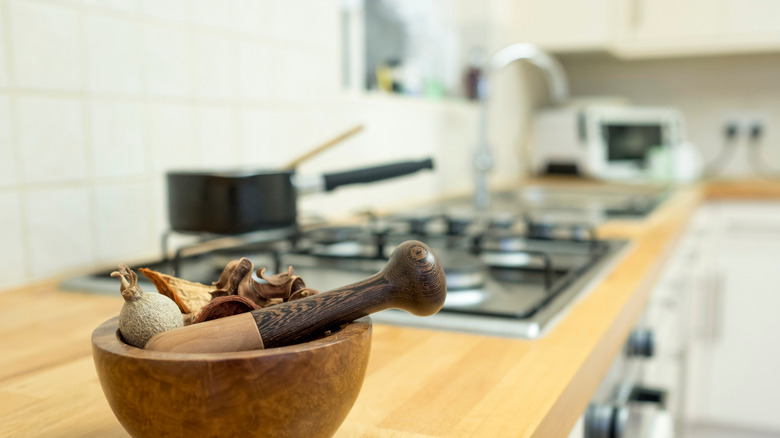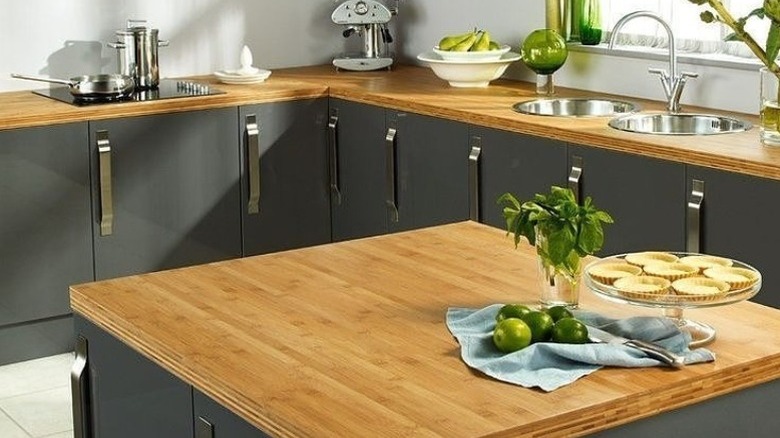14 Kitchen Countertop Materials, Explained
Whether you are buying a brand new kitchen or considering upgrading your cooking space, choosing a material for a countertop can be a difficult decision. Modern kitchens come in so many colors and finishes, and finding a worktop that ties everything together can be tricky.
The countertop takes the majority of the flak in the kitchen, so choosing a material that is robust and reliable is key, but aesthetics play a big part, too. Getting the balance between functionality and style is an essential part of creating a kitchen that you will love cooking in.
From solid wood to natural stone, most surfaces have pros and cons that need to be considered. Understanding the capabilities and required maintenance of each worktop type is crucial for you to make an informed decision that suits you and your family. Let's take a look at 14 kitchen countertop materials, to help you choose the perfect one for your home.
Laminate
Laminate countertops are an affordable option that allows you to have a kitchen that looks like it is made of stone or solid wood, but without the effort of maintaining it. Laminate worktops have come a long way since the 1950s, and you can use them to make your kitchen look modern and sleek without the hefty price tag.
Laminate countertops are made from medium-density fibreboard (MDF) topped with decorated sheets and then coated with a thin plastic film to seal it. This is where the 'fake' stone or wood comes in — the decorated sheet has a design printed on it that will transform the look of the worktop.
There are many benefits of laminate worktops, the first being the price — they are considerably less expensive than solid wood or stone. It is also much more manageable, needing only a quick wipe to maintain it, rather than special oils or treatments. Heat-resistance is another handy feature, meaning if you forget to put a pot stand out, your countertop will be able to tolerate a hot pan for a short while without being damaged.
If you are not fussy about having 'genuine' wood or stone countertops in your kitchen, laminate is an excellent option, and the wide range of designs and colors means you can have the kitchen of your dreams without breaking the bank.
Solid oak
For a timeless countertop that looks classy and has character, solid wood is the way to go. One of the most popular options is solid oak, which brings a warm touch to any kitchen.
Oak worktops are made from solid hardwood and will have a unique natural grain, which is one of the sought-after features of a wooden countertop. The color is usually golden-brown, though there will be natural variations in tone. If the countertop gets damaged, the wood can be sanded to reveal the fresh wood underneath, meaning that small scratches and bumps are not too much of a worry.
Compared to laminate, though, an oak worktop will need a little more attention. Water spills need to be cleaned up immediately, as the wood can warp or discolor, and protection should always be used before placing hot cookware on the surface. Be prepared to oil the surface three to four times a year, too, to keep it looking at its best. If you are happy with the extra maintenance effort, oak is a beautiful, natural option for your kitchen worktops.
Quartz
Quartz is a robust and attractive countertop material that is becoming increasingly popular with those who want a practical kitchen that also looks trendy and appealing. Made from 93% natural quartz, then bonded with silica, resin, and coloring, it benefits from the incredibly hard nature of quartz, but without some of the natural inconsistencies found in other worktop materials.
Quartz countertops are incredibly strong, making them ideal for a busy household, since they are less likely to get damaged. The fact that it is synthetic means there is a wide variety of colors to choose from, which makes it attractive to those who have a particular color scheme in mind for their kitchen.
The heat resistance of quartz is lower than that of many of the other materials on this list, so trivets and pot stands are essential. However, it does well with light scratches and stains and is easy to keep clean with soap and water. If you love the idea of natural stone, but with a wide range of colors and a little less maintenance, you should consider investing in a quartz worktop.
Glass
Glass countertops are a relatively new concept, and one you should consider if you want your kitchen to look unique. They will be a bold, modern addition to your kitchen, though they are among the most expensive options.
If you are imagining a thin, fragile sheet of glass, you can rest assured that we are talking about a very different concept — toughened glass that is shatterproof and, of course, waterproof, meaning that liquid spills don't need to cause any headaches. Although they are unlikely to break, glass worktops can be scratched by sharp knives and other utensils, so care needs to be taken to prevent this. As with windows, a glass worktop will also attract fingerprints, which could detract from the stunning effect unless you are constantly wiping them down.
The biggest issue with a glass countertop is likely to be the cost, since it is as expensive as premium options such as quartz and marble. If you are looking for a striking option and don't mind stretching the budget, glass is an eye-catching choice.
Marble
When it comes to elegant kitchen countertops, one material rises above the others — marble. It is a classic choice that will look great in any kitchen, and many people are attracted to its natural properties, including the Barefoot Contessa herself, as Ina Garten admits that marble countertops are her material of choice.
Every marble worktop is different, meaning your kitchen will be one of a kind, and the stone may have natural imperfections, which many people love. There are many colors that can run through natural marble, so each worktop could have veins of blue or green running throughout the stone. If you love to bake, marble is a brilliant option as it stays cool to the touch, meaning you can roll your dough straight on the cold surface.
The cost of a marble worktop isn't the only concern if you are considering this natural stone. As a porous stone, it can stain easily, and acidic liquids such as lemon juice can damage the surface. This means your usual vinegar cleaning hacks will need to take a back seat when it comes to a marble worktop. Looking after a marble countertop is going to take a little more effort than some of the others on this list, but if you can manage it, the reward will be a beautiful kitchen that is natural and unique.
Porcelain
If you love the idea of a natural stone worktop, but would prefer a low-maintenance version, then porcelain is the up-and-coming countertop material that you need to consider. As a mid-range option, it allows you to have a robust, attractive countertop that looks just as good as marble or granite.
Porcelain worktops are made from clay that has been subjected to temperatures well over 1,000 degrees Celcius, which transforms it into an incredibly hard material. It is non-porous, unlike natural stone such as marble, meaning that staining and damage are much less likely. The way in which it is made means that porcelain has extremely high heat resistance, which can be incredibly handy in a kitchen. In fact, they are so tough that they can even be used outdoors, so if your main criterion for your countertop is durability, porcelain should be near the top of the list. If you aren't too concerned about having completely natural materials for your kitchen worktops, porcelain is an excellent option that isn't difficult to maintain.
Granite
If you are determined to have natural stone in your kitchen, choosing granite worktops is a fairly low-maintenance, if expensive option. Made from igneous rock from deep in the earth's crust, it contains a variety of minerals that give it a unique and beautiful appearance.
Since granite forms over millions of years under extreme temperatures and pressure, it is safe to say that it can handle a few kitchen mishaps. It has incredible heat resistance and is strong and durable, making it a cost-effective option in the long term. Natural granite is porous, so it will need to be sealed before use to protect the stone from staining and damage.
Granite countertops come in a wide range of colors, many with contrasting flecks running through them, so you will be able to find a perfect match for your kitchen. The cost of a granite surface is similar to quartz or marble, meaning a significant investment at the beginning, but its durability should reduce the need for repairs over the years.
Copper
If you want your kitchen to be bang on trend, consider the increasingly popular option of copper countertops. The warm glow given off by the metal will give your kitchen a distinctive look that is both classic and modern at once.
Since these worktops are made from natural copper metal, the appearance will change over time. This is known as patina, and is one of the beloved features of natural materials. Unlike synthetic surfaces that will look identical a few years down the line, a copper countertop will weather as it ages, and some worktops are already aged when they are sold.
Copper is antibacterial and heat resistant, giving it an edge over many of the other materials on our list. However, it is a fairly soft metal, meaning it is likely to become scratched, especially by other metal implements. Of course, this may add to its rustic charm, so if that is unlikely to bother you, copper is a unique choice that is definitely worth considering.
Walnut
If you want a hardwood worktop but like to keep the tones of your kitchen dark and refined, walnut is an excellent choice. The deep wood can contrast brilliantly with lighter-colored cabinets to create a luxury kitchen environment. Though dark brown in color, walnut can also have purple tones running through it.
As a hardwood, walnut is fairly resistant to scuffs and scratches, but you should never chop directly onto the wood. If it is properly sealed, staining and spillages shouldn't be an issue either, and the wood itself has antibacterial properties.
If the walnut worktop is not sealed, it will need ongoing maintenance to keep it in great condition. Oiling at least twice a year is crucial to protect against water damage, and spillages should be cleaned up as quickly as possible. Walnut is one of the most expensive worktop options on our list — partly due to the scarcity of the trees — but it is a beautiful wood that, if cared for correctly, can bring warmth to your kitchen for years to come.
Stainless steel
Stainless steel worktops are standard in professional settings, but they are also a unique possibility in modern home kitchens. When done correctly, they can look sleek and trendy, and give your kitchen the feel of a first-class restaurant.
Stainless steel is an alloy made from iron, chromium, and a few other metals, and is famous for being rust-proof and keeping its shine. While it is an unusual option for a home kitchen, there are many attractive qualities that draw people to it. It is very easy to clean with just soap and water, meaning you don't need any fancy cleaning sprays to maintain it. It is also extremely heat resistant, so no need to panic if you place a pan directly onto it.
However, stainless steel does scratch easily, and although this could create an aged effect, if you prefer your countertops to look pristine, this could be a real issue. Along the same lines, since metals are malleable, dropping a heavy item onto a stainless steel countertop can cause a dent, which could ruin the look of the worktop for some people. If you are not bothered by a little wear and tear that could give the surface a weathered look, then stainless steel could be the ideal choice.
Soapstone
For those looking for a natural stone worktop without the price tag of marble or granite, soapstone is an up-and-coming option that will be a striking addition to a modern kitchen. Made of metamorphic rock that is mainly made of talc, it has a beautiful dark look with veins of color popping through it, and can create a fabulous contrast with other aspects of the kitchen that are wood or lighter-colored stone.
One big benefit of soapstone, other than the cost relative to the more premium stone, is its durability. It is heat resistant and doesn't stain easily, meaning that maintenance is fairly straightforward. It is non-porous, so unlike marble, a liquid spill isn't going to cause major issues. It will become aged, however, but many people see this as a positive trait of natural stone that will add character to the kitchen. If you are willing to go for a dark stone countertop in your kitchen, soapstone is a good value option that offers rustic elegance with relatively little maintenance.
Recycled
If you consider yourself a bit of an eco-warrior and like to conserve raw materials as much as you can, then why not extend this to your kitchen countertops as well? Recycled worktops are becoming increasingly popular, and are a great way for you to do your bit and create a unique kitchen at the same time.
The great thing about this option is that there are so many variations, so you can find something that will suit your tastes. From recycled glass to reclaimed wood and paper composite, there are many items that were destined for landfills that can make their way to your kitchen worktop instead. Perhaps surprisingly, recycled worktops can be very durable, so they are a good option if you want a reliable surface that doesn't need too much attention. If you fancy going down the recycled route, it is worth doing some thorough research to find the perfect sustainable material for your kitchen. There is no reason that you can't make an eco-conscious choice and have a stunning kitchen too.
Beech
If you want a natural option for your kitchen that will give a bright and airy feel, beech countertops are an excellent choice. This hardwood has an understated charm and is an affordable and durable material to add to your home.
The density of beech makes it a reliable option as a kitchen worktop. It can handle a bit of rough behavior without becoming too scratched, though you should always use a cutting board to protect it from sharp implements and staining. It is less porous than other hardwoods such as oak, making it less susceptible to water damage.
Beech worktops are relatively easy to clean, and some soap and water should do the trick most days. Over time it will certainly age, but it will maintain its charm and remain elegant like most hardwood countertops. For a natural surface that is more affordable than most, beech is a very appealing option.
Bamboo
If you like the look of a wooden countertop but want to opt for something a little different, consider bamboo. Though technically not a wood — it's actually a grass — it has the same aesthetic as natural woods and is a very eco-friendly material. Compared to real wood, bamboo grows significantly faster, making it much more renewable and sustainable.
Bamboo countertops are strong enough to put up with whatever your family can throw at them, and in some cases, they are stronger than hardwoods. You can seal a bamboo worktop for longevity, which will make it more resistant to water and staining. However, dropping heavy items onto the surface could leave dents, so care is needed if you want it to stay pristine.
Bamboo is not highly resistant to heat, and the surface can be damaged if you place hot pans directly onto it. Pot stands and trivets are crucial to avoid burning a bamboo countertop. Bamboo is an excellent eco-friendly option that will enhance your kitchen and last for years, as long as you are willing to give it a little TLC.
